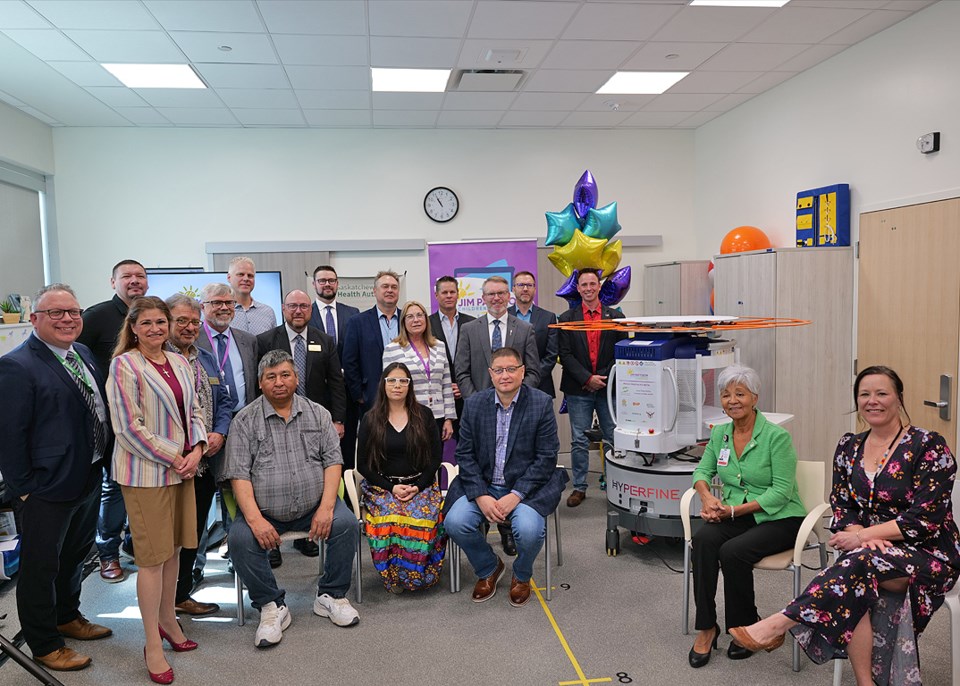SASKATOON — Equipment that will enable brain scans to be done at the bedside of pediatric patients is now in place at the Jim Pattison Children’s Hospital.
Saskatchewan children two years and older will benefit immediately from the province’s first portable pediatric medical resonance imaging machine. The Swoop Portable MR Imaging System is able to complete brain scans at the bedside within minutes and allow family to be present, providing comfort and convenience to Saskatchewan’s youngest patients.
Watch a video introducing the system.
Jim Pattison Children’s Hospital Foundation spearheaded a partnership with Synergy 8 Community Builders and major donor Gene Pidwerbesky raising $1 million dollars to purchase Saskatchewan’s first pediatric portable MRI. The Government of Saskatchewan will provide $419,000 annually to the Saskatchewan Health Authority (SHA) to support the MRl’s operational costs, and be available for children eight hours a day, five days a week. This funding also includes support for an MRI Technologist.
This portable MRI would be used in the Pediatric Intensive Care Unit and in trauma situations, such as the emergency department at the JPCH to perform imaging of the head. The scans can help physicians diagnose a variety of neurological conditions, including those caused by head injuries and suspected abuse.
“This innovative piece of equipment is on the cutting edge of how we improve the care of children when they are critically ill,” Saskatchewan Health Authority Head of Pediatrics Dr. Terry Klassen said. “The demand for the type of imaging this portable MRI provides is great so as a physician, I am excited to see it in use at the hospital. We are very grateful to the JPCH Foundation and the Ministry of Health for making this happen.”
In 2023-24, the SHA reported 2,993 pediatric patients received MRI services. In the last five years over 14,400 pediatric patients have received MRI services.
“The Saskatchewan Health Authority is thrilled to have yet another important piece of medical imaging equipment for staff and clinicians to use to help them deliver exceptional health care to our pediatric patients,” Clinical and Support Services Vice President Bryan Witt said. “We all know coming to a hospital for an appointment can be intimidating for our young patients especially when it comes to something like an MRI. Having the Swoop® Portable MR Imaging System, when appropriate, will make it much easier for the children, their families and our staff to get these images taken with as little disruption as possible. Thanks to the Jim Pattison Children’s Hospital and their generous donors for helping to make this happen.”
“It takes transformational vision to put Jim Pattison Children’s Hospital on the world stage and today’s announcement of Saskatchewan’s first pediatric portable MRI does just that, “Jim Pattison Children’s Hospital Foundation President and CEO Brynn Boback-Lane said. “We are immensely grateful for dedicated donors that ensure medical advancements and innovation happen here at home.”
Health Minister Everett Hindley joined representatives from the Saskatchewan Health Authority, Jim Pattison Children’s Hospital Foundation, Indigenous leaders and major donors to celebrate the launch May 14.
“Thank you to the Jim Pattison Children’s Hospital Foundation and other major donors for the generous contributions that have enabled our province to acquire the first pediatric portable MRI,” Hindley said.
The 2024-25 Provincial Budget includes an increase of $5.1 million for specialized medical imaging services to add essential CT and MRI capacity in the province. This expansion will help increase access and reduce waitlists for these important diagnostic procedures.




